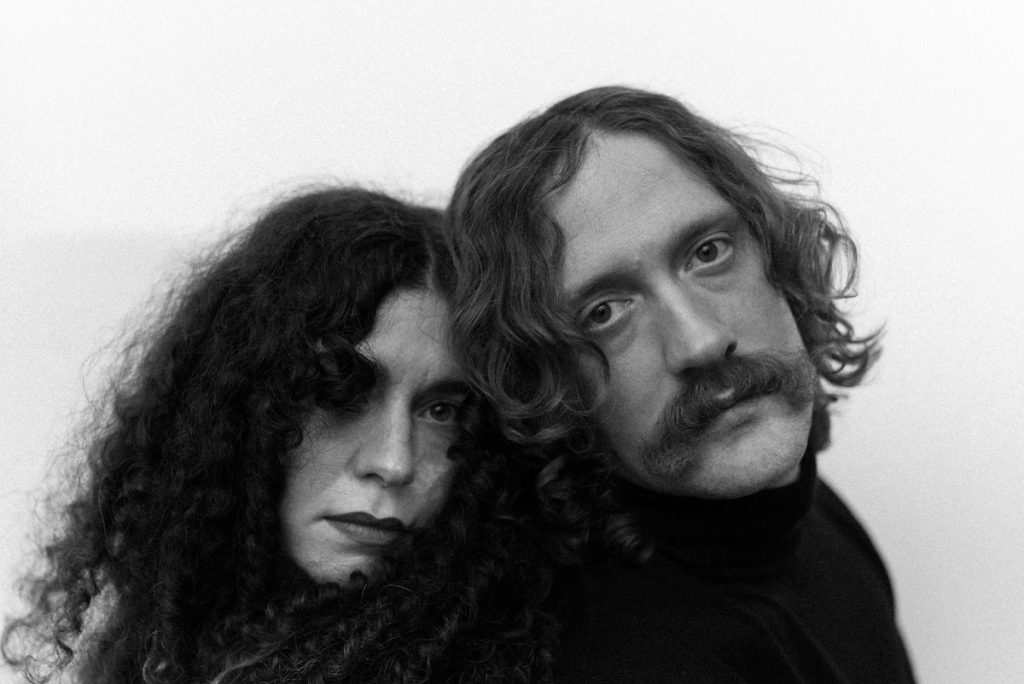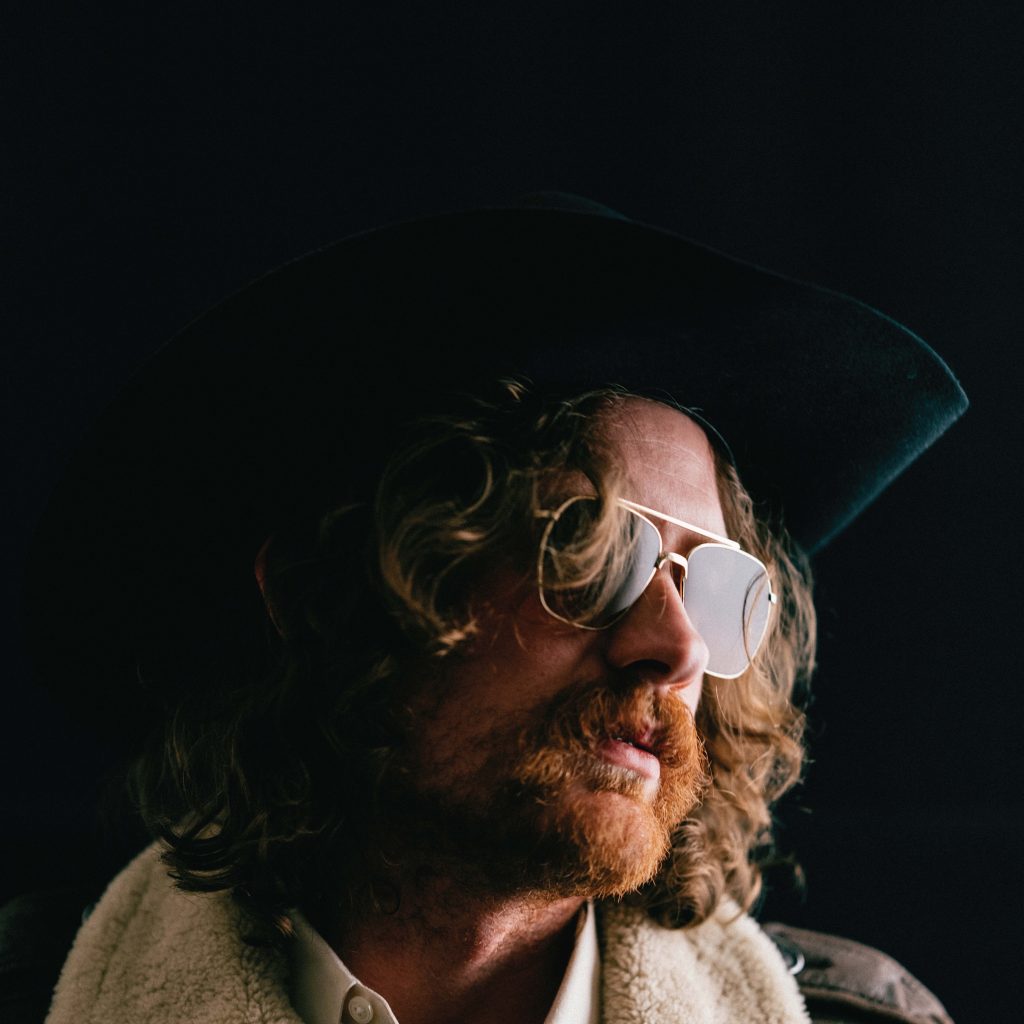Culture
Honey Harper’s William Fussell and Alana Pagnutti talk to WOUB Culture about making ‘country music for everyone’ and ‘Honey Harper and the Infinite Sky’
By: Nicholas Kobe and Emily Votaw
Posted on:
COLUMBUS, Ohio (WOUB) — The latest record from Honey Harper, “Honey Harper and the Infinite Sky,” will be released Friday via ATO records.
The band is currently on tour in North America, stopping at the A&R Music Bar (391 Neil Ave.) Thursday. WOUB’s Nicholas Kobe had the privilege of talking with Will Fussell, Honey Harper’s frontman, and Alana Pagnutti, his long term-collaborator and wife.
A condensed and edited transcript of the interview can be found below.

William Fussell: Honey Harper at one point was country music for people who don’t like country music. Now we believe that Honey Harper is country music for everyone. <laugh>
Nicholas Kobe: So, what kind of influences does Honey Harper draw from and how did you kind of go about the process of melding them all together?
Alana Pagnutti: Honey Harper in general starts with a lot of influence from Gram Parsons. That was a huge one.
William Fussell: Gram Parsons and Brian Eno melting together to make something that’s not just philosophically cosmic country — but also aesthetically and sonically as well. Like, we heard “Apollo” by Brian Eno and we were like: ‘let’s make that record, but with vocals.’ And I don’t know if we necessarily accomplished that or not with “Starmaker,” but that was the initial thought process behind it. We wanted to make country music that sound like it was recorded in space. This new record definitely is a little more earthbound — influenced very much by the country rock of the ’70s. We weren’t intentionally trying to make something that sounded — “throwback” isn’t the right word — but, you know, we wanted to make something that sounded like you took a ’70s rock band and put them in 2022.
“… we heard “Apollo” by Brian Eno and we were like: ‘let’s make that record, but with vocals.’ And I don’t know if we necessarily accomplished that or not with “Starmaker,” but that was the initial thought process behind it. We wanted to make country music that sound like it was recorded in space. This new record definitely is a little more earthbound — influenced very much by the country rock of the ’70s.” – William Fussell of Honey Harper
Nicholas Kobe: Before we really dive into “Honey Harper and the Infinite Sky,” looking back on your first album, “Starmaker,” how do you feel about that record in retrospect now that you have more time behind it? And what would you say you learned in the process of making that album?
Alana Pagnutti: I look back at that record, and I still love every single track. Like, listening to it on Spotify — I still am like, “Wow!” Not to toot our own horn, but I feel like it’s a nearly flawless record.
William Fussell: Wow!
Alana Pagnutti: I really do. I love that record. I just think, and we’ve said this before — but it feels like it should have been our fourth record, not our first.
William Fussell: Yeah, that’s what a lot of people have said. I feel like that record was extremely important. We put so much painstaking effort and time into producing it — and it took almost two and half years. We were recording in London, in Paris, in Hungary with an orchestra — with weirdo pop stars in the bowels of Soho in London. It was kind of about making country music in a places that don’t typically create that kind of music. About taking the geographic roots out of country music and sort of displacing it.
Alana Pagnutti: We really did take a really long time with “Starmaker,” which we didn’t do with this record. We did it like much faster. With “Starmaker,” we were definitely trying to do something very specific and I think it resonated with people. I don’t think maybe it resonated with as many people as we would’ve liked it to. We released that record the week before the world shut down. So I think it never got that much of a fair shot, but I think we learned from making such a niche sound with that record that we wanted to maybe make something a little more broad with this one.
Nicholas Kobe: So far as your approach on “Honey Harper and the Infinite Sky,” you mentioned trying to make something that would appeal to a wider audience — could you elaborate on that a little bit more? You also said you recorded it faster. Why did you do that?

Nicholas Kobe: What was it like working with a seven-piece band? What was the collaboration process like?
William Fussell: It was amazing. I mean, honestly, like, because they were just so good. The thing that was really great about this band was that not only were they amazing players, but they also had great taste. You can find lots of amazing players who can do what you ask them to do, but to also find people who really understand what you’re trying to do — so far as understanding the references you’re making and not only just understand them, but also can show you what your reference is referencing — that’s a really rare thing.
Nicholas Kobe: That sounds like a lot of fun. It makes sense in the context of what you said earlier, about wanting to take a rock band from the ’70s and bring them to 2022. Doing a record that way is really authentic.
William Fussell: I think it’s definitely one of the most fun ways to record a record. You’re just recording to tape. You feel like you’re back in time! That authenticity thing is something that we talked a little bit about too with this record — and how so much of Americana and country music is based on these rock solid foundations and these rules about authenticity. We did a lot of thinking about that, like, ‘does authenticity really exist?’ The problem is, the more authentic you try to be, the less authentic you are. Just like the cooler you try to be, the less cool you really are. It’s interesting to think about country music and Americana in that way. Like, in the ’60s, all the players from the ’50s would say the country music of the ’60s wasn’t real country music — which is the same thing the players from the ’60s would say about the country music in the ’70s. We just live in this weird postmodern hellscape that doesn’t allow you to really see any true, authentic, original idea anymore.
Nicholas Kobe: Could you walk me through the sort of concept behind Honey Harper as a character?
William Fussell: Originally I think there was a bit of a identity crisis with Honey Harper and myself. I struggled — and probably will always struggle, with the understanding of whether I am that person or not. Or if it’s my inner child coming out, in a way. But I think originally Honey Harper was supposed to be me. Right?
Alana Pagnutti: You know what I totally just realized too: I feel like for a really long time Will wasn’t comfortable with the idea of “country music” and what it represented because of being a Southern person. I think he had some issues around it, just trying to explore who he could be and who he was. Now, as I’m thinking back on it, I feel like Honey Harper was created as a way for Will to be comfortable releasing country music and with being a Southerner. So you didn’t have to perform country music using William Fussell as your own name.
William Fussell: Wow — we really did some therapy tonight.
Alana Pagnutti: I know. That all just like clicked for me. I was like looking at you being like, “Whoa, how did we not realize this?”
William Fussell: Yeah. For so long I did a lot of work to get rid of my accent and to distance myself from being “Southern.” But you know, it comes out when I drink, and it comes out when I’m hanging out with other Southerners. It sounds like I never left Adel. That’s also what it’s like when I get around my dad, around my family — like that drawl comes back out. But I think that Alana is also the main force of why this project exists too. I don’t think I would’ve even done it if you hadn’t of encouraged me to start recording that first EP — and then as you slowly became involved with the project, you became a part of the character of Honey Harper, too.
Alana Pagnutti: Fair enough, that’s kind of how it’s evolved. Honey Harper is less of a person now, and more of a concept, maybe.

Alana Pagnutti: I come from a contemporary art background. I did art history in undergrad and then did my master’s in contemporary art in New York. Then I met Will in New York and we moved to London together. So I was coming at the project more from the angle of the visuals and the concepts.
William Fussell: The thing that really works about us is that we are both quite creative and can come up with great conceptual ideas. However, I am absolutely terrible at bringing those ideas to fruition — but that is what Alana is very good at.
Alana Pagnutti: Will’s not great with execution.
William Fussell: Execution is definitely not my bag.
Alana Pagnutti: I do think our strengths and weaknesses compliment each other. I guess the art background combined with the music background is sort of what created Honey Harper.
William Fussell: Especially with how “Starmaker” happened. It came from you showing me things like John Cage and Robert Rauschenberg and Mark Cunningham and all these great artists and choreographers and composers — I’m literally talking about a thing that you wrote a book about. So I really shouldn’t even be talking about it!
Alana Pagnutti: You go ahead. This is how I can see if you’ve actually read the book or not! (Editor’s note: the book is “Reception The Radio-Works of Robert Rauschenberg and John Cage”)
“I feel like for a really long time Will wasn’t comfortable with the idea of “country music” and what it represented because of being a Southern person. […] Now, as I’m thinking back on it, I feel like Honey Harper was created as a way for Will to be comfortable releasing country music and with being a Southerner. So [he] didn’t have to perform country music using William Fussell as [his] name.” – Alana Pagnutti of Honey Harper
Nicholas Kobe: What are your thoughts about country music today, and why is it so important to push it forward?
Alana Pagnutti: Well, we really love pop country music. While I do think it’s important that country music should be propelled forward, I also do acknowledge how important pop country music is.
William Fussell: People need to stop taking the words that people use to describe things so seriously. It’s hard to not do that with something like country music, Americana or folk music, which are traditionally very serious kinds of things. Now pop country is not serious anymore. And that’s fine! “Real country music” now is called Americana. Pop country is a different thing. One of the really interesting things that I think is happening inside of Americana and maybe slowly in pop country, is that there’s a new diverging road — with people who wanna stay close to this weird right wing ideology and the other people who are trying to take the genres into a more free world. So much of American music, all of American music, has either been created completely by POC or it’s been changed and reinvigorated by them.
Alana Pagnutti: I mean I think that sonically pop country music is great and I think it should still exist. And like Will said, I think there needs to be more diversity in it for sure. I think that’s where pop country music needs to change and move forward.
Nicholas Kobe: So shifting gears a bit — let’s talk about the lyrics on the new record. What are some of the major points lyrically that you kind of wanted listeners to come away with on this record?
Alana Pagnutti: I don’t think there’s one overarching idea or theme like there was for “Star Maker.” These songs are all based on our own life experiences, whereas maybe some of the “Star Maker” songs were a little more story.
William Fussell: Well, for “Ain’t No Cowboys In Georgia,” the sort of underlying theme is something I took from one of the last things my grandfather ever said to me through a Facebook message when he was really angry at me. Our relationship really deteriorated over the years. I did an interview where I was talking about my family in South Georgia and in that interview I alluded to something about him saying that you can never trust a cowboy. And he went off in this long rant to me on Facebook. As most, you know, grandparents probably do on Facebook. At the end of it, one of the last things he said was “By the way, there ain’t no cowboys in Georgia.” And I was like, “Whoa, that’s a great song line, song title. Thank you for that.” He’s sent many crazy messages that had great lines.
Nicholas Kobe: One last question for you, and I’m sure it’s difficult to think about this in the midst of an album rollout, but where do you see Honey Harper going next?
Alana Pagnutti: Yeah, this is definitely not difficult for us to think about because Will’s already planned like four records from now. This is the issue. This is the whole problem! We’re still rolling this album out and Will’s already like written five more records and I’m like, “Will, can we just please focus on this record” and he will not focus anyway.
William Fussell: I don’t have the brain for just focusing on one thing! Like, I have lots of ideas. I just can’t execute them. Like you said! It’s kind of like a pick a card. One option is something that we’re tentatively calling “Computer Country” where all the songs will be, written hopefully with some interesting electronic producers. But everything will be digital — to completely strip all the authenticity out of it. And we’re going to write the songs with an AI. I’m going to write songs and feed them into an AI and have it write back to me, and then we will go back and forth and make a country record. The other one is “Alter Ego,” and I won’t go fully into it, but the basic idea is that it’s just a pop country singer. And it’s not supposed to be making fun of anything or anything like that. It’s gonna be real. It’s my Andy Kaufman dive into pop country. I feel like I’m giving away all the ideas. Oh well. Anyway, the third I haven’t even told Alana about yet, I think. So, I want to make something like Bonnie Raitt’s “Streetlights” and Jim Sullivan’s “U.F.O.,” but with a Motown back beat and bass, with strings.
Alana Pagnutti: That’s a really cool idea!
William Fussell: I’m really hot on it! I’ve already written four or five songs for it! So maybe, that’s what’s next for Honey Harper.
Honey Harper performs at the A&R Music Bar in Columbus (391 Neil Ave.) on Thursday. “Honey Harper and the Infinite Sky” is released Friday via ATO Records. Find more information and all of the band’s tour dates at this link.

